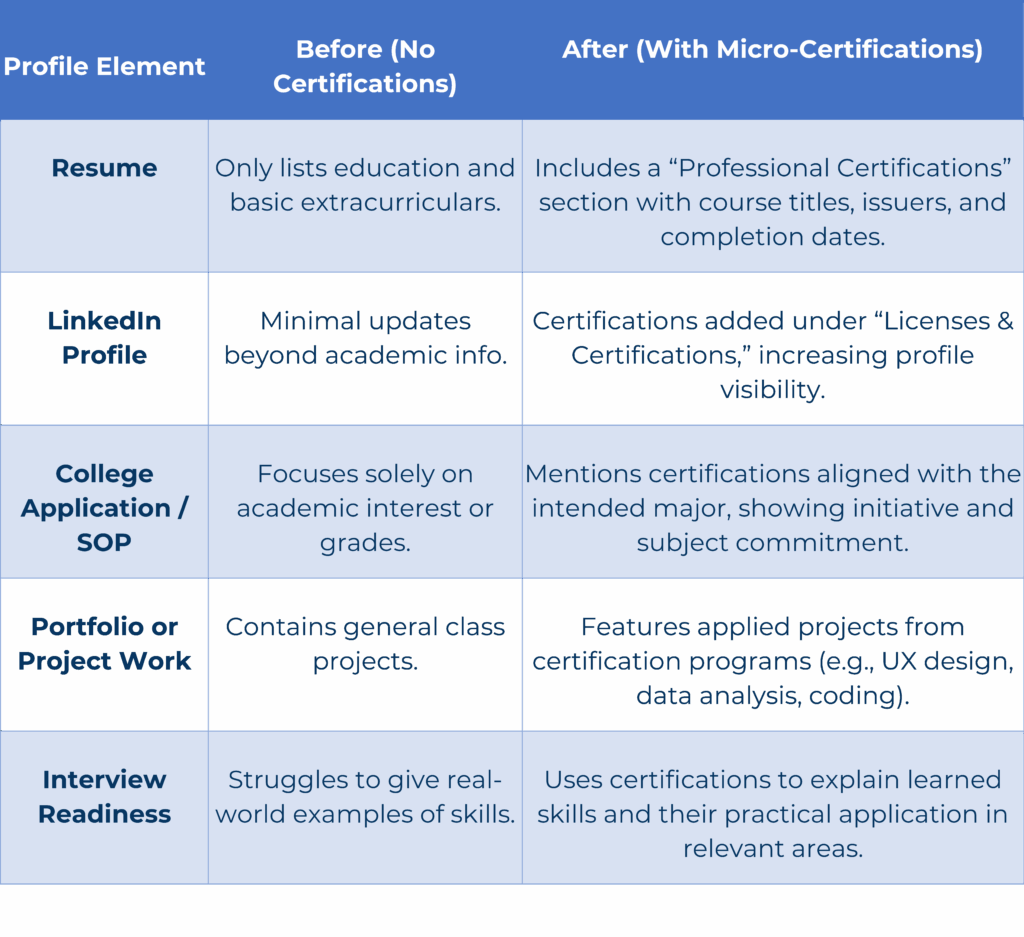
Benefits of Micro-credentials for Career Growth
Did you know that 75% of employers in 2025 consider certificate programmes as viable alternatives to degrees? While your classmates are relying solely on their academic transcripts, smart students are building competitive advantages through micro-credentials. These are short, focused online courses from platforms like Coursera, Udemy, PUMA CE, and NPTEL.
These learning programmes are changing how students approach professional development, offering a strategic way to enhance profile building for internship opportunities and future career success.
What Are Micro-Certifications and Why Should Students Care?
Micro-credentials are skill-based programmes that have a short duration and usually last weeks or months. Unlike traditional degrees, these certifications target specific competencies that employers actively seek in today’s workforce.
The key features of micro-credentials include:
- Short-term, skill-based learning – Complete courses in 4-12 weeks
- Issued by recognised platforms – Coursera, Udemy, edX, NPTEL, PUMA CE
- Digital badges and certificates – Shareable proof of completion
- Industry-relevant content – Updated regularly to match market demands
- Flexible scheduling – Learn at your own pace
The integration of micro-credentials in higher education and micro-credentials and digital badges in higher education has made these certifications increasingly valuable for students looking to differentiate themselves in competitive academic and professional environments.
Benefits of micro-credentials for Students
The benefits of micro-credentials extend far beyond simply adding lines to your resume. Here’s how these certifications can transform your academic and professional trajectory:
- Demonstrate initiative and self-learning – Including micro-credential certificate achievements in your student profile shows potential employers and admissions committees that you’re proactive about skill development and committed to continuous learning.
- Make your portfolio student profile stand out – In a sea of similar academic backgrounds, specialised certifications in emerging fields like AI or data analytics can be the differentiating factor that catches a recruiter’s attention.
- Align with emerging industry trends – Online career certification programs in fields like artificial intelligence, climate studies, and data analytics prepare you for tomorrow’s job market, not just today’s.
- Boost practical skills without full-time commitment – These programs allow you to develop job-ready competencies while maintaining your regular academic schedule, making them perfect for busy students.
- Support ongoing professional development – Starting early with career courses online establishes a pattern of lifelong learning that employers highly value.
- Enhance profile building for internship opportunities – Many internship applications now specifically ask about additional certifications and skills beyond your degree program.
What to Look for in a Micro Credential Certificate
Are all online certification courses worth it? Not quite, online micro-credentials vary in quality. When choosing programs to enhance your student education profile, focus on these key factors:
- Recognised issuing bodies – Choose programs from established platforms like Coursera, edX, PUMA CE, NPTEL, or directly from industry leaders like Google, Microsoft, or IBM. These carry more weight in micro-credential certification recognition.
- Career alignment – Select courses that complement your academic stream or target career path. A computer science student might pursue AI certifications, while a business student could focus on digital marketing or data analytics.
- Industry credibility – Look for programs developed in partnership with leading companies or universities. These careers with certificate programs often have direct pathways to employment.
- Assessment and project components – Choose courses that include hands-on projects or assessments rather than just passive video consumption. This provides tangible portfolio pieces for your portfolio student profile.
- Digital badge compatibility – Check if your micro-credential includes a digital badge. These are verified icons that showcase your skills and can be added to your LinkedIn profile or portfolio, making it easier for recruiters to view and trust your credentials.
Top Fields Where Micro-Certifications Thrive
Certain industries have embraced career training online more readily than others. Here are the top fields where micro-certifications can significantly impact your career prospects:
- Artificial Intelligence & Machine Learning – Google AI courses, IBM Watson Machine Learning, NPTEL Deep Learning programs, and Coursera’s Machine Learning Specialisation offer comprehensive introductions to this rapidly growing field.
- Data Analytics & Data Science – Microsoft Power BI certification, Google Data Analytics Certificate, Coursera Data Science programs, and IBM Data Science Professional Certificate provide practical skills in data interpretation and visualisation.
- Climate Studies & Sustainability – FutureLearn Climate Change courses, edX Sustainable Development programmes, and PUMA CE Environmental Science certifications address one of the world’s most pressing challenges while opening doors to emerging green careers.
- Digital Marketing & Communication – HubSpot Content Marketing, Google Digital Garage courses, Facebook Blueprint certification, and Coursera Digital Marketing Specialisation prepare students for the evolving world of digital communication.
- Cybersecurity – CompTIA Security+, Coursera Cybersecurity courses, and IBM Cybersecurity Analyst programmes address the growing need for digital security professionals.
How to Add Micro-Certifications to Your Student Profile
Effectively integrating online career certification programs into your student education profile requires strategic presentation. Your certifications should complement, not compete with, your academic achievements.
1. Create a dedicated certifications section – Add a “Professional Certifications” or “Additional Qualifications” section to your resume, separate from your education section. List the certification name, issuing organisation, and completion date.
2. Leverage LinkedIn and professional platforms – Upload your microcredential certificate directly to LinkedIn’s certification section. This increases visibility to recruiters and builds your professional online presence.
3. Include in college applications and SOPs – When applying for higher education or internships, mention relevant certifications in your statement of purpose. Explain how these career courses online align with your academic and career goals.
4. Showcase project work in portfolios – Many micro-certification programs include capstone projects. Include these in your portfolio student profile as evidence of the practical application of learned skills.
5. Reference in interviews – Prepare specific examples of how your micro-certifications have enhanced your understanding or capabilities in relevant areas.
Before vs After: Student Profile With and Without Micro-Certifications

Conclusion
Micro-credentials are a powerful tool for students seeking to build competitive profiles in the current job market. By strategically selecting and integrating online career certification programs into your student education profile, you demonstrate initiative, acquire relevant skills, and position yourself ahead of peers in both academic and professional pursuits. The key lies in choosing certifications that align with your career goals and complement your traditional education.
Boost your student profile with certifications that align with your goals. Get personalised support through Mindler’s International Certified Career Coach Programs.
FAQs
What are micro-credentials, and how are they different from degrees?
Micro-credentials are short, targeted programs designed to build specific skills. They usually take a few weeks or months, unlike degrees that take years and cover broader subjects. Micro-credentials focus on practical, job-ready training and can enhance your profile for internships, jobs, or further studies.
How do micro-certifications help with internships and job placements?
Micro certifications show employers that you’ve taken initiative and developed specialised skills. They boost your CV during profile building for internships or entry-level roles. In some cases, these certifications align directly with job requirements, making you a stronger candidate in competitive fields.
Are online micro-credentials recognised by employers?
Yes. Certifications from trusted platforms like Coursera, NPTEL, Google, or Microsoft are widely accepted. Employers value them for their focus on relevant, in-demand skills. To maximise their impact, choose programs that align with your career goals and display them on your CV or LinkedIn.
Can I add micro-credentials to my college applications?
Yes. Including relevant micro-credentials in higher education applications shows admissions committees your commitment to learning beyond the classroom. These certifications can strengthen your student profile and demonstrate preparation for your chosen field of study.
What are some reliable platforms for online career certification programs?
Top platforms for career training online include Coursera (university partnerships), edX (MIT/Harvard founded), NPTEL (Indian institutes), PUMA CE (specialised programs), Udemy (diverse course catalogue), and direct programs from companies like Google, Microsoft, and IBM. Choose platforms based on your field of interest and career goals.



